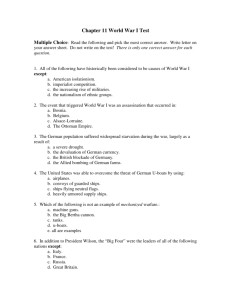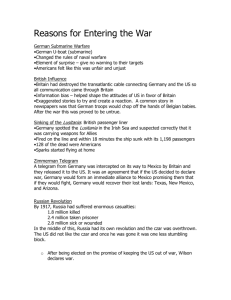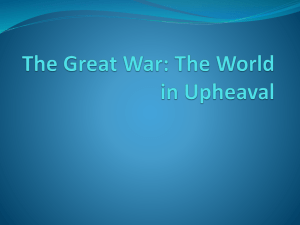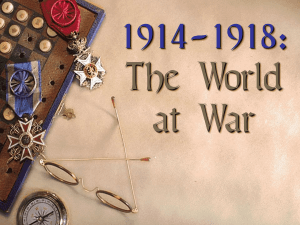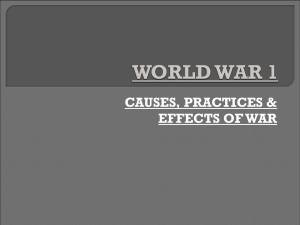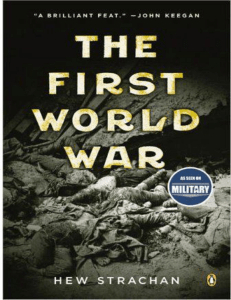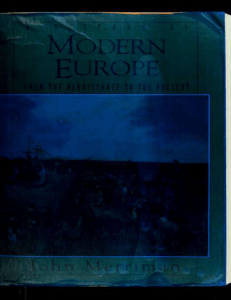Unit 6 Review Worksheet The Stage is Set For War
advertisement
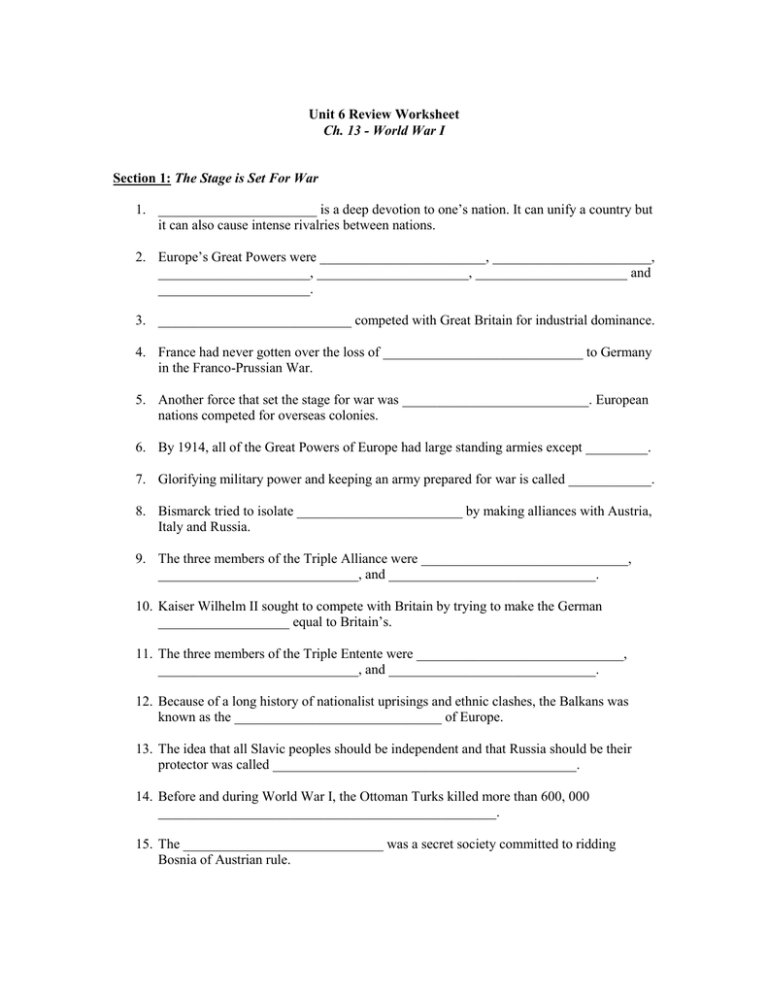
Unit 6 Review Worksheet Ch. 13 - World War I Section 1: The Stage is Set For War 1. _______________________ is a deep devotion to one’s nation. It can unify a country but it can also cause intense rivalries between nations. 2. Europe’s Great Powers were ________________________, _______________________, ______________________, ______________________, ______________________ and ______________________. 3. ____________________________ competed with Great Britain for industrial dominance. 4. France had never gotten over the loss of _____________________________ to Germany in the Franco-Prussian War. 5. Another force that set the stage for war was ___________________________. European nations competed for overseas colonies. 6. By 1914, all of the Great Powers of Europe had large standing armies except _________. 7. Glorifying military power and keeping an army prepared for war is called ____________. 8. Bismarck tried to isolate ________________________ by making alliances with Austria, Italy and Russia. 9. The three members of the Triple Alliance were ______________________________, _____________________________, and ______________________________. 10. Kaiser Wilhelm II sought to compete with Britain by trying to make the German ___________________ equal to Britain’s. 11. The three members of the Triple Entente were ______________________________, _____________________________, and ______________________________. 12. Because of a long history of nationalist uprisings and ethnic clashes, the Balkans was known as the ______________________________ of Europe. 13. The idea that all Slavic peoples should be independent and that Russia should be their protector was called ____________________________________________. 14. Before and during World War I, the Ottoman Turks killed more than 600, 000 _________________________________________________. 15. The _____________________________ was a secret society committed to ridding Bosnia of Austrian rule. 16. The event that triggered the start of World War I was the assassination of _________________________________ by 19 year old __________________________. 17. The four underlying causes of World War I were __________________________, ______________________, ______________________, and ______________________. 18. Austria consulted with its ally _________________________, then issued an ultimatum to Serbia. 19. Serbia accepted most of the conditions, but Austria still __________________________. Section 2: War Consumes Europe 20. The purpose of the Schlieffen Plan was to conquer _________________________ before ____________________________ could mobilize in the east. 21. Britain declared war on Germany when the German army invaded __________________, which was a neutral country. 22. The Central Powers included _______________________, _______________________, ________________________, and _________________________. 23. The Allies included __________________________, ________________________, and _________________________. Japan and Italy joined later. 24. The deadlocked region in northern France became known as the ______________ ___________________. 25. The defeat of the Germans at the ___________________________________________ left the Schlieffen Plan in ruins and meant Germany would have to fight a two-front war. 26. Fighting in World War I was marked by a stalemate caused by _____________________ ___________________. 27. The space between the trenches was called ____________________________________. 28. New weapons included __________________________, _________________________, ______________________, ______________________, and ______________________. 29. The main results of the battles of ____________________ and _____________________ were that both sides suffered huge casualties. 30. The _________________________________________ was a stretch of battlefield along the German and Russian border. 31. The German army crushed the invading Russian army at the Battle of _______________. 32. Although the Russian army weakened by 1916, it aided the Allied war effort by keeping hundreds of thousands German troops occupied in ______________________________. Section 3: The War Affects the World 33. The Gallipoli campaign was designed to end the __________________________, take the city of __________________________, defeat the ___________________________, and establish a ___________________________________________________________. 34. In 1917, Germany returned to its policy of _____________________________________, hoping to destroy the British ships blocking German ports. 35. In 1915, a German u-boat had sunk the British passenger ship _____________________, which was carrying 128 United States citizens. 36. In the ______________________________________, the German government promised Mexico to help them _______________________________________________. 37. World War I was a _____________________________ in that countries devoted all their resources to the war effort. 38. Under a system of _________________________________, people could only buy small amounts of items needed for the war effort. 39. Governments used _______________________________ to keep up morale and support for the war effort. 40. The _______________________________ ended the war between Germany and Russia. 41. Russia’s withdrawal from the war allowed Germany to send _______________________ ________________________________________. 42. The decisive battle of the war took place in July 1918 at the _______________________ ____________________________________. 43. In November 1918, Kaiser Wilhelm II was forced to step down and Germany signed an ________________________________, agreeing to end the fighting. The war was over. From the 1st Semester Unit 1 - Rise of Democratic Ideas (Prologue Secs. 1 & 2) 44. Democracy was first developed in Ancient ____________________________________. 45. In Plato’s ideal government the ruler would be a _______________________________. 46. Rome developed a ______________________________, a form of government in which citizens elect leaders who make government decisions. 47. Written laws helped establish the idea of a “__________________________________”, where even rulers and powerful people could be held accountable for their actions. 48. Rome’s greatest legacy was a _________________________________________, which applied equally and impartially to all citizens. 49. The Hebrews’ written legal code, called ________________________________, focused on morality and ethics. Unit 2 - Democratic Revolutions (Ch. 5-5, Ch. 6-2 & 6-4) 50. ______________________ proposed that a separation of powers into three branches would keep any individual or group from gaining total control of government. 51. _______________________ said governments were instituted among men to protect the natural rights of individuals. 52. When King John tried to raise taxes on English nobles in 1215, they forced him to sign the ____________________________, which limited the power of the English monarchs 53. The bloodless overthrow of James II is called the _______________________________. 54. At this point England was no longer an absolute monarchy but a ____________________ _________________________, where laws limited the ruler’s power. 55. To make clear the limits of the king’s power, Parliament drafted a __________________. This document listed many things a king could not do, including: 56. After the Revolutionary War began in 1775, the Second Continental Congress issued the Declaration of Independence, which was written by _____________________________. Unit 3: The French Revolution (Ch. 7) 57. The success of the ____________________________________ inspired members of the 3rd Estate in France. 58. After the king called for the Estates-General to meet, problems broke out over ________ ___________________________________________. 59. Instead of meeting with the other two estates, the delegates of the 3rd Estate voted to form a _______________________________ and pass laws and reforms in the name of the people. 60. The delegates took a pledge, called the _______________________________________, promising to continue meeting until they had drawn up a new constitution. 61. On August 27, 1789, the National Assembly adopted a statement of revolutionary ideals called the _______________________________________________________________. 62. In the summer of 1793, Robespierre became the leader of the ______________________ ________________________, which was created to identify “enemies of the republic”. 63. Napoleon’s final defeat occurred at the Battle of ________________________________. 64. The MAIN goal of the Congress of Vienna was to establish _______________________ and __________________________________________ for the entire continent. Unit 4 - Industrial Revolution (Ch. 9) 65. The first country to Industrialize was _________________________________________. 66. The first type of business to industrialize was the _______________________________. 67. The two most important natural resources were ______________ and ______________. 68. The growth of the factory system (industrialization) led to ________________________, which is city building and the movement of people to cities. 69. Factories developed in clusters because they were built near _______________________. 70. Merchants and factory owners were part of a growing ______________________ that became wealthy as a result of industrialization. 71. _____________________________ is an economic system in which money is invested in business ventures with the goal of making a profit. Unit 5 – New Imperialism (Ch. 11) 72. Three factors that discouraged Europeans from conquering Africa before the late 1800s were powerful __________________________, impassable _________________, and the disease ______________________. 73. According to ___________________________, non-Europeans were considered to be on a lower scale of development because they lacked the technology of the Europeans. 74. External forces that enabled the European imperialism included the inventions of the ________________ and the ________________________ and the development of the drug ____________________ to combat malaria in Africa. 75. The two primary purposes of the Berlin Conference were to prevent _________________ between the Europeans and to _______________________________________________. 76. The most troublesome political legacy from the colonial period was the dividing of the _________________________________________, which created unnatural boundaries. 77. India was the most valuable British colony because it was a major supplier of ________ _______________________.


